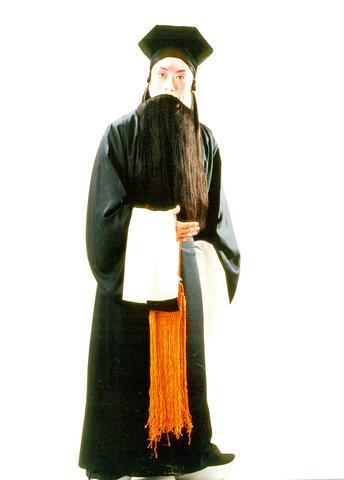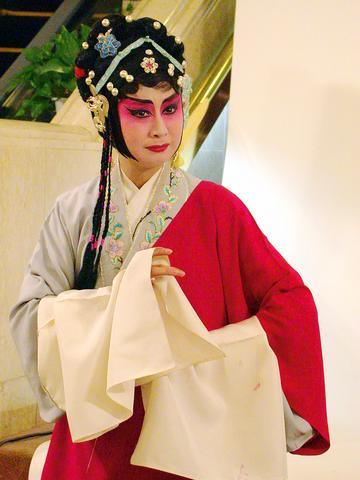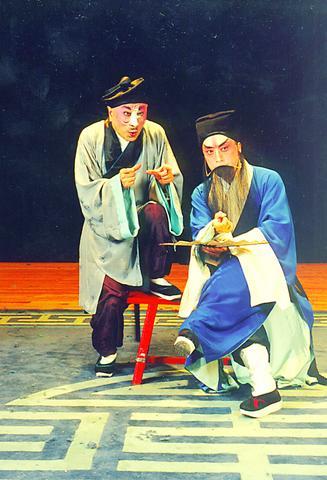Hugely popular martial arts opera star Li Bao-chun (李寶春) makes a welcome return to the stage this weekend for a series of performances at Taipei's Novel Hall. Entitled Choice Peking Opera with Li Bao-chun (新老戲之四齣好老戲), the series of shows, which begins tomorrow evening, will see Li teaming up with some of the biggest names in Beijing opera to perform reworkings of four classic operas.
Born in Hebei Province in 1950 to a celebrated theatrical family, Li was the first son of the legendary Beijing opera star, Li Shao-chun (李少春). At 10 he was admitted to the Beijing opera school where he studied for eight years. On graduation he was assigned to the Chinese National Opera Troupe.
Li relocated to the US in the mid-1980s, where he was awarded the outstanding Asian artist award by the Chinese American Arts Council in 1987. In 1989 Li moved to Taiwan and helped establish the Taipei Nova Chinese Opera Troupe, which he now heads.

PHOTO COURTESY OF KOO FOUNDATION
He specialized in the role of the bearded old man (Laosheng, 老生) in his formative years in China, but Li's name has since become synonymous in Taiwan with the high-flying martial arts combat hero, (Wusheng, 武生). While it is his high-flying portrayals of Wusheng and the Monkey King that have made such an indelible mark on Taiwan's opera scene, Li remains proficient in all operatic roles.
Organized by the Koo Foundation (辜公亮文教基金會), this weekend's performances feature four very different styles of opera that showcase not only Li's more acrobatic opera side, but also his down-to-earth and more vocal operatic skills as well. All the shows have been extensively reworked by Li in order to reduce their length and enable him to highlight the best parts.
The series includes a special adaptation of the Kun opera (崑曲) Fifteen Strings of Copper (十五貫), scenes from the classic Qing Dynasty opera The Jade Cup Named Snow White (一捧雪), the fast paced and high-flying martial arts opera Wu Zi-xu, the Innocent Fugitive (

PHOTO COURTESY OF KOO FOUNDATION
Performance notes:
What: Choice Peking Opera with Li Bao-chun (
Where: Taipei's Novel Hall (

PHOTO COURTESY OF KOO FOUNDATION
What: Saturday through Wednesday, June 9.
Tickets: Tickets cost from NT$500 to NT$1,500 and are available from ERA Ticketing Outlets nationwide, or direct from the Novel Hall.

Dissident artist Ai Weiwei’s (艾未未) famous return to the People’s Republic of China (PRC) has been overshadowed by the astonishing news of the latest arrests of senior military figures for “corruption,” but it is an interesting piece of news in its own right, though more for what Ai does not understand than for what he does. Ai simply lacks the reflective understanding that the loneliness and isolation he imagines are “European” are simply the joys of life as an expat. That goes both ways: “I love Taiwan!” say many still wet-behind-the-ears expats here, not realizing what they love is being an

Google unveiled an artificial intelligence tool Wednesday that its scientists said would help unravel the mysteries of the human genome — and could one day lead to new treatments for diseases. The deep learning model AlphaGenome was hailed by outside researchers as a “breakthrough” that would let scientists study and even simulate the roots of difficult-to-treat genetic diseases. While the first complete map of the human genome in 2003 “gave us the book of life, reading it remained a challenge,” Pushmeet Kohli, vice president of research at Google DeepMind, told journalists. “We have the text,” he said, which is a sequence of

Every now and then, even hardcore hikers like to sleep in, leave the heavy gear at home and just enjoy a relaxed half-day stroll in the mountains: no cold, no steep uphills, no pressure to walk a certain distance in a day. In the winter, the mild climate and lower elevations of the forests in Taiwan’s far south offer a number of easy escapes like this. A prime example is the river above Mudan Reservoir (牡丹水庫): with shallow water, gentle current, abundant wildlife and a complete lack of tourists, this walk is accessible to nearly everyone but still feels quite remote.

It’s a bold filmmaking choice to have a countdown clock on the screen for most of your movie. In the best-case scenario for a movie like Mercy, in which a Los Angeles detective has to prove his innocence to an artificial intelligence judge within said time limit, it heightens the tension. Who hasn’t gotten sweaty palms in, say, a Mission: Impossible movie when the bomb is ticking down and Tom Cruise still hasn’t cleared the building? Why not just extend it for the duration? Perhaps in a better movie it might have worked. Sadly in Mercy, it’s an ever-present reminder of just